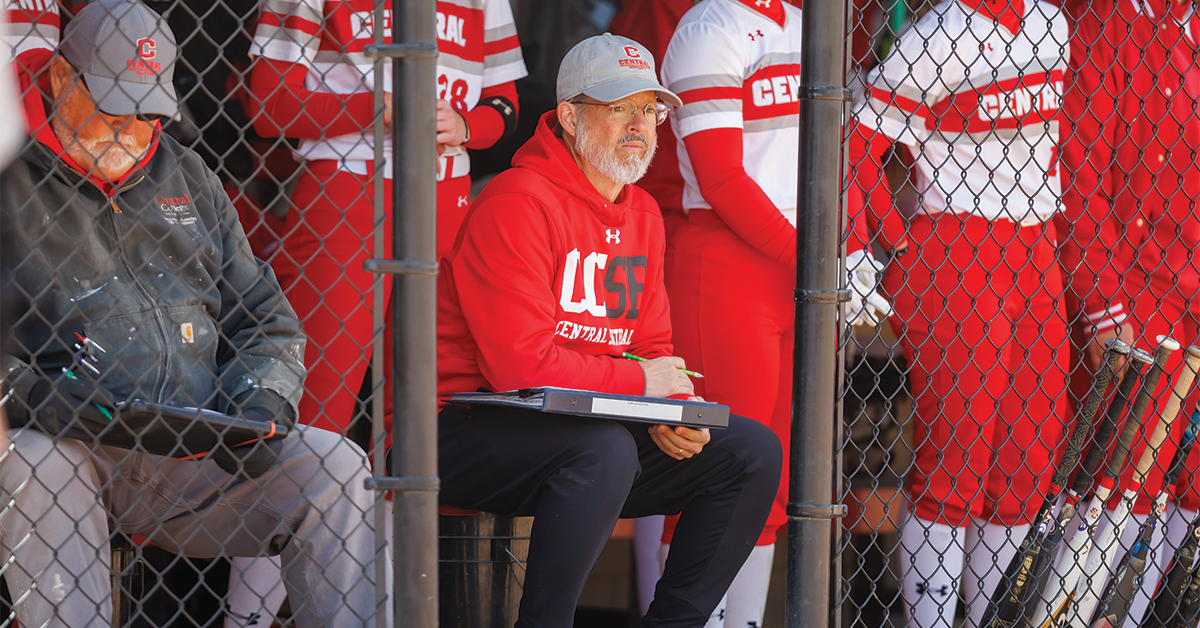
Central faculty member Keith Jones, Mark and Kay De Cook Endowed Chair in Character and Leadership Development and professor of psychology, values the opportunity that serving as a part-time assistant softball coach provides to connect with students in new ways.
Keith Jones heard himself say yes before he’d even processed the question.
He was at a Central College staff picnic in 2013 with George Wares ’76, Central’s head women’s softball coach and lecturer of kinesiology, and still finishing his watermelon when Wares, partly joking but mostly serious, asked Jones if he’d like to be an assistant coach. Jones was simultaneously startled and thrilled that the winningest coach in NCAA Division III softball history was offering him a chance to be on the playing field in a college sport — the secret dream of millions of American sports fans.
But Jones is the Mark and Kay De Cook Endowed Chair in Character and Leadership Development and professor of psychology, not a softball coach. And his coaching background was largely limited to helping with a few of his kids’ youth sports teams.
From Roe (Center) to Whoa
“I immediately said yes,” Jones says. “But then my mind went to, ‘Wait, what? Really, why me? I have zero experience coaching collegiate sports, I haven’t coached women, I haven’t coached softball.’ So, George and I met later to work through this. He said, ‘We think you can be good, and we can teach you about Central softball.’
“To me, it was a sense of what did they see that I don’t get? But then after we talked, I was thinking, OK, they see something. They know things that I don’t. I mean, clearly, they’re incredibly successful. And so I thought, ‘OK, let’s see if it clicks.’
“So, then I went to a handful of fall practices just to see what this would be like. And I thought, ‘Why would I not want to be part of that?’”
While Russ Goodman, professor of mathematics and assistant women’s soccer coach, had a longtime interest in soccer, his previous coaching experience was even less extensive than Jones’s. He was still new at Central in 2002 when he and his wife Linda met then-coach Cory Ann Ellis, who was in her first season and in need of help. Suddenly, Goodman found himself on the practice field.
“I did a little bit with the goalkeepers,” he said. “I would just shoot at them; I didn’t know what I was doing.”
Rick Burns, a veteran collegiate head coach, took over in 2004 and pushed Goodman to get formal training through the United Soccer Coaches goalkeeper coaching licensing program. He was hooked.
“I really enjoyed how technical it was, how precise it was and just how special it was to kind of have that goalkeeper team within the team,” he said. “It felt pretty impactful for me.”
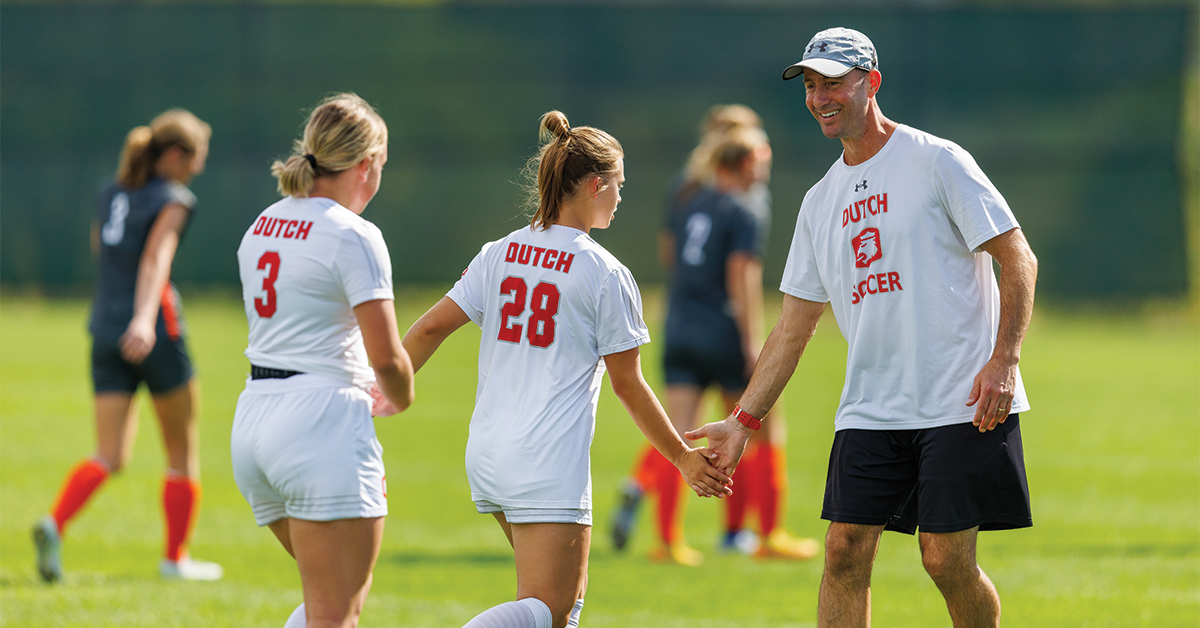
Professor of Mathematics Russ Goodman finds coaching Central’s women’s soccer goalkeepers requires teaching the same kind of problem-solving skills his math students use.
The Comeback
It was once common for Division III coaches to come from the ranks of faculty. In the 1970s and 1980s, Norman “Doc” Ryerson, former education faculty member, and Michael Schrier, emeritus associate professor of history, built Central dynasties in men’s golf and men’s tennis, respectively. It was normal to see a basket of optic yellow tennis balls parked behind Schrier’s office door on the ground floor of Geisler Library or a stack of scorecards piled on Ryerson’s second-floor office desk.
The dual roles were partly a matter of fiscal prudence but also reflected the college’s philosophical approach. The original Division III philosophy authored by the late Kenneth Weller, Central president emeritus, articulated the notion that college athletics are not extracurricular but cocurricular, a part of a well-rounded education, not an isolated activity.
As recruiting and administrative responsibilities grew, more and more Division III schools started hiring full-time coaches, a trend Weller bemoaned; although at Central, some coaches still provide instruction in the kinesiology department.
Weller believed to his core that athletes who were diligent students became better athletes, and students who were committed to developing as athletes became better students. He also saw mutual benefits for faculty and coaches and celebrated those with dual roles, like Jones and Goodman.
Women’s Soccer Coach Mike Kobylinski says the benefits for his players of having a faculty member on staff are obvious.
“I think it’s been massive for our program,” he says. “It’s no coincidence that our team GPA has been so high. Russ talks to a lot of players (about classes) on road trips and is with them during study times, so that’s been fantastic.”
Goodman also alerts Kobylinski to stressful periods on the academic calendar.
“He does that every year,” Kobylinski says. “Like when it’s finals time or just when they have heavy loads, he puts gentle reminders in my ear, and we might back (practice) down a little bit or talk with the captains about how we can adjust things.”
That’s the Goal
Goodman found a fascinating symmetry in his academic and athletics teaching.
“I think coaching goalkeeping goes really well with the notion of problem-solving, math and thinking logically — especially when it’s 90 degrees out, you’re tired, it’s the 90th minute of the game and you have to be thinking logically with a level head to solve problems,” Goodman says. “That’s what soccer is all about.”
“It sounds kind of simple to say that, but training and knowing, ‘OK, so my defender’s here, should I come out or maybe not? Where’s the attacker? Is she looking down at the ball or is she looking up directly at me? Is she looking for a teammate to pass to? Do I stay back because her head is up and she’s looking to pass?’ Understanding what the cues are and processing that quickly is all problem-solving.”
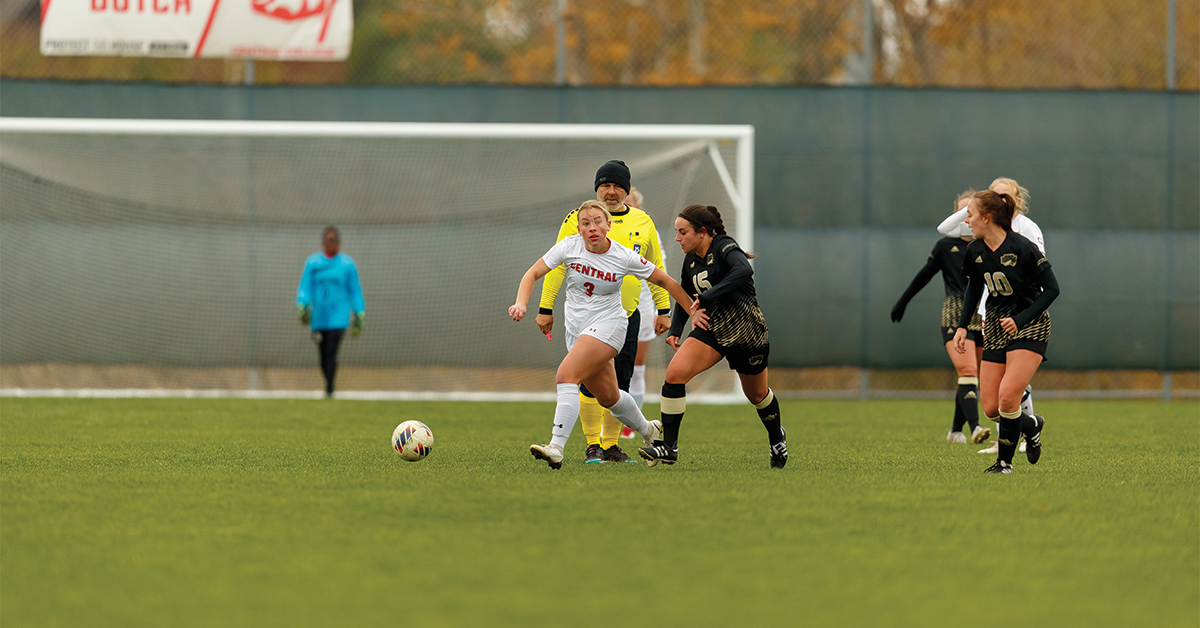
Central women’s soccer players, like forward Hailey Hunter ’24 (above), have easy access to professor/coach Russ Goodman as an academic resource.
Building Bridges
Goodman, who takes pride in the Central women’s soccer team’s 11 consecutive USC Team Academic Awards, also said that his coaching work helps tear down any silos that might exist on either part of the campus.
“At any institution, that dynamic and tension between academics and athletics is always there, right?” he says. “I try to be a good liaison in both directions.”
“When coaches are talking about, ‘We should do x, y or z,’ or ‘This is how things should be,’ I’ll occasionally offer a perspective for how the academic dean typically feels or faculty typically feel. And vice versa when we’re in a faculty meeting or I’m talking to colleagues, I’ll chime in, either confirming or challenging some of the assumptions that my colleagues may make. There are so many coaches, especially at Central, who care very deeply for their athletes and for them to be even better students than they are athletes.”
“I enjoy that position of living with one foot in each world because I’m really committed to both sides of it,” Goodman adds.
Credit Where Credit is Due
But what Jones and Goodman value most is the ability to connect with students in a new way, as well as the eye-opening perspectives they quickly gain. Jones recalls his first team workouts.
“They had 5:30 a.m. practices and it was about three days in when I had a different appreciation for the student-athlete experience,” Jones admits. “Because now I’m thinking, ‘OK, I know what you’re going through.’
“For me, that connection was transformative in a way as a teacher because I always think that the better I know students, the more effective I am teaching them. And they know me more as a person, rather than just someone teaching a class, so we can create this educational and learning context.”
Likewise, Goodman has learned about scrambling to get to practice following a late-afternoon class, and the dexterity required to pull off a clothing change in a parked car. He’s noticed students’ perceptions of him change when they learn he coaches.
“I think (coaching) gives me a little bit of credibility with our students because so many of them are student-athletes and they think ‘Oh, here’s a guy who knows what I’m going through, he’s got to have the same kind of time management that I do,’” Goodman says. “I think that helps me maybe build better relationships with some of the students.”
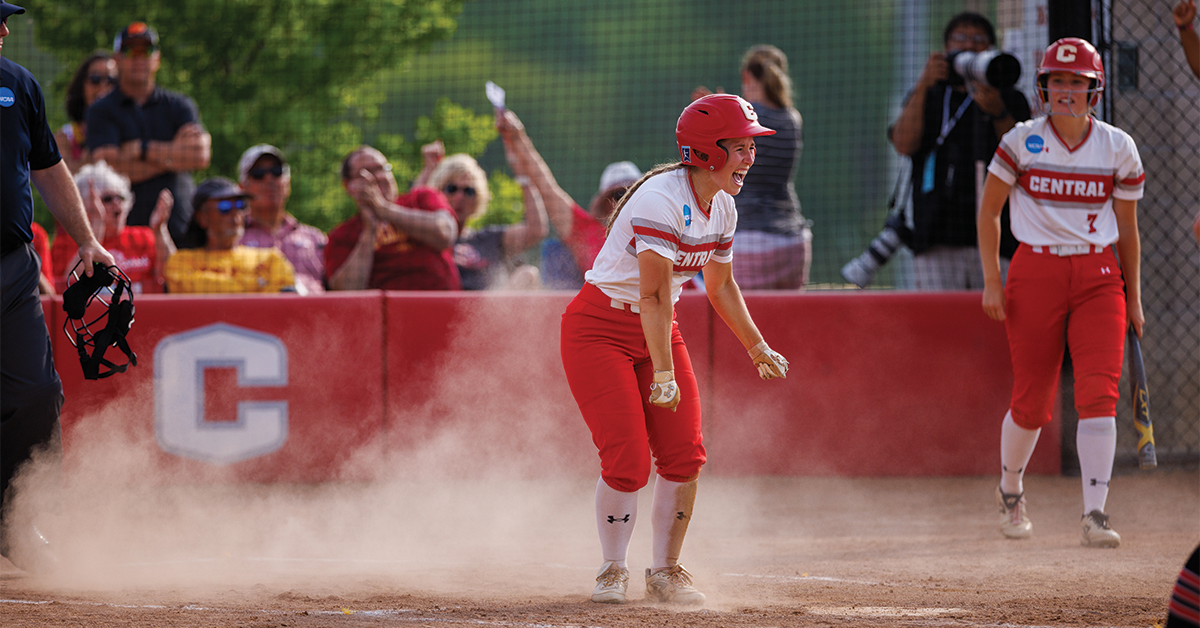
For players like outfielder Megan Doty ’23, the Central softball field is a classroom, according to Psychology Professor Keith Jones.
The More You Know
Those relationships are part of the Central ethos.
“That’s one of the great things about Central,” Jones says. “We’ve had consultants come in and tell us, ‘Hey, a root word for you at Central is empathy.’ And when we have shared experiences, empathy is easier to have. It’s easier for me to appreciate someone the more I know them.”
Jones sees similarities in the methods used by great professors and those that have made Wares successful for nearly four decades.
“One of the first things is simultaneously being able to know what it takes to basically operate at a championship level and then care for those people who are on the team, to care for them as people and players at the same time,” Jones shares.
“Sometimes as a professor, it’s easy to think of a student in your class just as a student in your class. But you can teach better when you realize, ‘Oh, they’re a person with this whole life. Part of it is being a student and part is being a student in my class.’ And with players, it’s a similar way of thinking. ‘Oh, yeah, they’re a player who happens to be a student who is a person with all these other attributes.’ And so as you get to know people and develop those relationships, that allows you to hold yourself accountable and hold others accountable because we’ve got a relationship where we know each other and you can do that.
“It’s developing relationships, developing trust and then having the techniques and the knowledge of what it takes to operate at that high level.”
Best. Job. Ever.
Ed Willis, professor emeritus of psychology, is a long time colleague and mentor for Jones. He served as a volunteer assistant coach with Central’s 1974 Division III champion football squad.
“One of the things Ed mentioned to me when he learned I was going to do this was, you’re going to work incredibly hard, but it’ll be one of the best experiences of your life here,” Jones recalls. “It will change how you teach because you’re not going to teach students anymore, you’re going to teach people.”
That personalized teaching approach, without regard to subject matter or setting, has long been part of the magic of the Central experience. It’s what Jones observed from Willis.
“Somebody once said to him, ‘Oh, Ed, I didn’t know you work at the college,’” Jones shares. “And Ed said that he was a professor there. The person replied, ‘Oh, what do you teach?’ Ed said, ‘18- to 22-year-olds.’”
Maximizing Performance, Protecting Health Through Technology
Generous support from donors is allowing Central College to enhance both academic opportunities as well as athletics performance through the use of Catapult GPS accelerometers.
The tiny devices are positioned in a small vest worn between an athlete’s shoulder blades and track key performance indicators during competition and practices, providing insights into the stresses that athletes are experiencing. Initially tested by the women’s soccer team, the devices are now extensively used by the football team.
“It gives us a comprehensive picture of athlete wellness,” says Katelin Valster, assistant professor of kinesiology. “And then we can do some specific monitoring on individual athletes or position groups to inform training and understand any of the stresses that the body is going through.”
Jeff McMartin ’90, head football coach, and Kyle Johnson ’02, strength and conditioning coordinator and fitness center director, rely on the data to guard against overstressing an athlete while determining optimum conditioning levels. “You believe your eyes, but it gives you some data that can alert you before you can see someone trail off and get overtrained,” Johnson shares.
Johnson combines the reports with the data his staff receives from wellness surveys the players complete daily on their phones that record perceived exertion levels. The student research opportunities are robust as well.
“It’s kind of three-fold,” Valster says. “The projects are driven by students that are interested. We get to collaborate with the athletics department and then through it, we have a unique connection to alumni, not only through their financial support but as our students end up connecting with alumni that are in the field at Division I schools or wherever, and how they use Catapult.”
Not every athlete is monitored so the data provides a generalized picture. Central’s staff found the information so beneficial that additional donor support was solicited and the college now has 40 devices.
“I was talking to a grad recently who is at a (mid-level Division I) school, and he said they only had 10,” Valster shares. “And when I told him we had 40, he was blown away.”
Given its potential within academics and athletics, all sides are interested in seeing where this technology and research can take us.
Athletics Updates
ACADEMIC ALL-AMERICA®: Central had a record six athletes gain College Sports Communicators Academic All-America honors during 2022-23. Joining the list in the winter and spring were wrestler Gage Linahon ’24, women’s golfer/triathlete Thea Lunning ’23 and men’s and women’s track and field and cross country runners Megan Johnson ’24, Noah Jorgenson ’24 and Caroline McMartin ’24.
BASEBALL: Central was 15-24 but improved its American Rivers mark to 8-16 and narrowly missed the conference tournament, placing seventh. Right fielder Colton DeRocher ’24 was an ABCA all-region second-team pick after hitting. 380 with eight homers and 38 doubles. Following the season, assistant Adam Carey ’19 was named the program’s new head coach.
MEN’S GOLF: Harold Dobernecker ’24 finished fifth at the American Rivers tournament, gaining all-conference honors for the third time. The Dutch placed third overall.
SOFTBALL: Central made a record 31st NCAA tournament appearance. The Dutch were 33-11 overall and 11-5 in conference play, finishing 23rd in the final NFCA Division III rankings. Center fielder Emma Johnson ’23 was a first-team all-region pick while second baseman Haley Bach ’25 was a second-team choice. Pitcher Sydni Huisman ’23 and third baseman Franie Burnett ’24 were third-team picks.
MEN’S TENNIS: Trey Melvin ’23 and Nick Scott ’24 gained all-conference distinction. The Dutch finished 12-11, coming in third in the conference at 6-2.
MEN’S AND WOMEN’S TRACK AND FIELD: Four Central athletes received All-America honors. Caroline McMartin ’24 was third in the women’s 3,000-meter steeplechase at the NCAA Division III in Rochester, New York, while Megan Johnson ’24 was seventh. Caleb Silver ’23 was eighth in the men’s steeplechase, Noah Jorgenson ’24 was eighth in the 800 and Brody Klein ’24 was fifth in the decathlon. The women tied for 31st overall and the men tied for 40th. They were third and fifth, respectively in the American Rivers meet











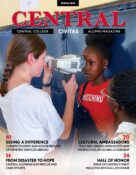
To encourage serious, intellectual discourse on Civitas, please include your first and last name when commenting. Anonymous comments will be removed.
Comments are closed.